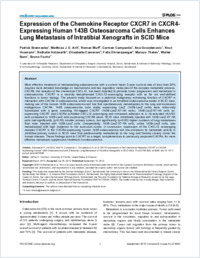Expression of the chemokine receptor CXCR7 in CXCR4-expressing human 143B osteosarcoma cells enhances lung metastasis of intratibial xenografts in SCID mice
- Brennecke, Patrick Laboratory for Orthopedic Research, Department of Orthopedics, Balgrist University Hospital, Zürich, Switzerland
- Arlt, Matthias J. E. Laboratory for Orthopedic Research, Department of Orthopedics, Balgrist University Hospital, Zürich, Switzerland
- Muff, Roman Laboratory for Orthopedic Research, Department of Orthopedics, Balgrist University Hospital, Zürich, Switzerland
- Campanile, Carmen Laboratory for Orthopedic Research, Department of Orthopedics, Balgrist University Hospital, Zürich, Switzerland
- Gvozdenovic, Ana Laboratory for Orthopedic Research, Department of Orthopedics, Balgrist University Hospital, Zürich, Switzerland
- Husmann, Knut Laboratory for Orthopedic Research, Department of Orthopedics, Balgrist University Hospital, Zürich, Switzerland
- Holzwarth, Nathalie Institute of Veterinary Pathology, Division of Immunopathology, University Zurich, Switzerland
- Cameroni, Elisabetta Institute for Research in Biomedicine (IRB), Faculty of Biomedical Sciences, Università della Svizzera italiana, Switzerland
- Ehrensperger, Felix Institute of Veterinary Pathology, Division of Immunopathology, University Zurich, Switzerland
- Thelen, Marcus Institute for Research in Biomedicine (IRB), Faculty of Biomedical Sciences, Università della Svizzera italiana, Switzerland
- Born, Walter Laboratory for Orthopedic Research, Department of Orthopedics, Balgrist University Hospital, Zürich, Switzerland
- Fuchs, Bruno Laboratory for Orthopedic Research, Department of Orthopedics, Balgrist University Hospital, Zürich, Switzerland
-
10.09.2013
Published in:
- Plos one. - 2013, vol. 8, no. 9, p. e74045
English
More effective treatment of metastasizing osteosarcoma with a current mean 5-year survival rate of less than 20% requires more detailed knowledge on mechanisms and key regulatory molecules of the complex metastatic process. CXCR4, the receptor of the chemokine CXCL12, has been reported to promote tumor progression and metastasis in osteosarcoma. CXCR7 is a recently deorphanized CXCL12-scavenging receptor with so far not well-defined functions in tumor biology. The present study focused on a potential malignancy enhancing function of CXCR7 in interaction with CXCR4 in osteosarcoma, which was investigated in an intratibial osteosarcoma model in SCID mice, making use of the human 143B osteosarcoma cell line that spontaneously metastasizes to the lung and expresses endogenous CXCR4. 143B osteosarcoma cells stably expressing LacZ (143B-LacZ cells) were retrovirally transduced with a gene encoding HA-tagged CXCR7 (143B-LacZ-X7-HA cells). 143B-LacZ-X7-HA cells coexpressing CXCR7 and CXCR4 exhibited CXCL12 scavenging and enhanced adhesion to IL-1β-activated HUVEC cells compared to 143B-LacZ cells expressing CXCR4 alone. SCID mice intratibially injected with 143B-LacZ-X7-HA cells had significantly (p<0.05) smaller primary tumors, but significantly (p<0.05) higher numbers of lung metastases than mice injected with 143B-LacZ cells. Unexpectedly, 143B-LacZ-X7-HA cells, unlike 143B-LacZ cells, also metastasized with high incidence to the auriculum cordis. In conclusion, expression of the CXCL12 scavenging receptor CXCR7 in the CXCR4-expressing human 143B osteosarcoma cell line enhances its metastatic activity in intratibial primary tumors in SCID mice that predominantly metastasize to the lung and thereby closely mimic the human disease. These findings point to CXCR7 as a target, complementary to previously proposed CXCR4, for more effective metastasis-suppressive treatment in osteosarcoma.
- Language
-
- English
- Classification
- Medicine
- License
- Open access status
- gold
- Identifiers
-
- RERO DOC 326841
- DOI 10.1371/journal.pone.0074045
- ARK ark:/12658/srd1318911
- Persistent URL
- https://n2t.net/ark:/12658/srd1318911
Statistics
Document views: 222
File downloads:
- Texte intégral: 198
